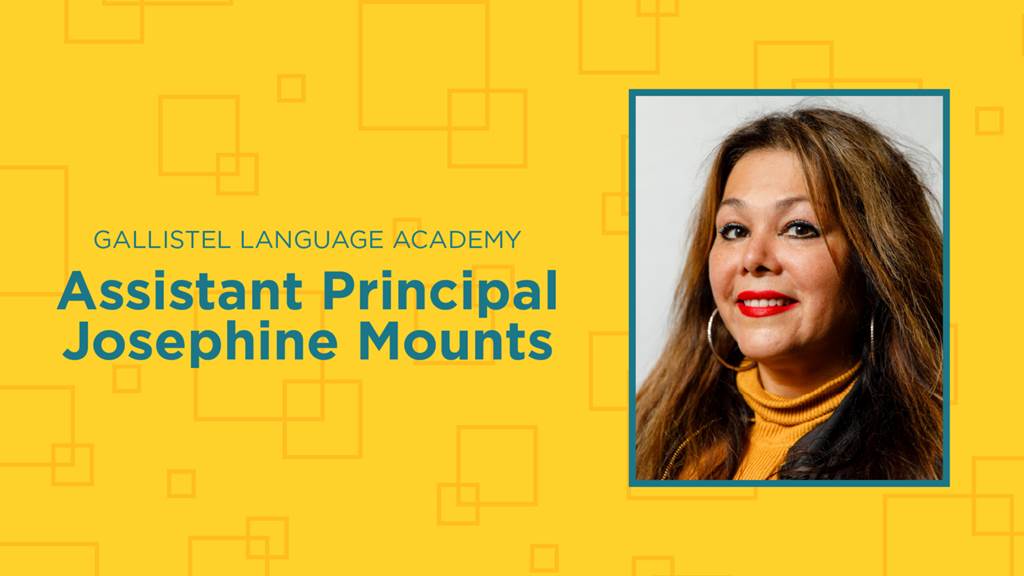Advocating for Bilingual Students through Equity-Informed Policy
10 December 2020
By Josephine Mounts, Assistant Principal at Gallistel Language Academy

One thing I’ve learned as a school administrator over the past 20 years is there are many common goals that parents have for their students. I remember my own mom had an aspiration in the early 1980s for me to attend a top high school in Chicago. Today, the popularity of the district’s selective enrollment schools shows that thousands of parents across the city have this same goal.
When I first came to Chicago in seventh grade, some culture shock occurred because of my background and the fact that I did not know English very well. While I was born in the U.S., I spent my prior educational years in Mexico, in a sink or swim learning environment that caused me to heavily prioritize mastering Spanish and immersing myself in Mexican culture.
Coming back to the U.S. meant that language acquisition was everything to me because there was so much I wanted to accomplish. I especially wanted to connect more deeply with my dad, who spoke no Spanish. But I didn’t always feel that my bilingual classroom focused on equity in the ways that it needed to. I was in a classroom that spanned multiple grade levels with instruction that centered more on oral proficiency rather than the cognitive demands of learning a language.
So I put in the work outside of school. I would listen to songs on the radio and try to pick out 10 words every day that I didn’t know. These words would swirl around in my brain until I could ask someone what they meant. I’ll never forget the day I asked my dad what the word debt meant, and he laughed and responded: “That’s a word you’ll know all your life, kid.”
My journey at CPS—from seventh grade through the end of high school—reflects years of growth and hard work. I was able to become student council president at Farragut Career Academy and develop a strong foundation toward college and a career.
As a teacher, much like my goal of learning 10 new words each day, I made it a priority to help students set these small, day-to-day goals and celebrate the successes that came with reaching them. And now, as a school administrator, I work tirelessly to advocate for my students and help them to think about their plans for long-term success.
I recently had a former student who was getting ready to apply to college come back to Gallistel so that I could help her work through her FAFSA. She told me that a friend had asked her why she was returning to her elementary school to get help, and she had said: “My family does not know how to navigate this, and I need to see someone who understands what it means to be me.”
There is a sense of pride in being able to support bilingual students and help them reach their goals through working for CPS—the same district that I graduated from. And I feel even more proud having seen firsthand the progress that the district has made through its renewed focus on equity and wider range of programs that celebrate our students’ bilingualism and see their cultural backgrounds as assets rather than limitations.
Now, I feel that our next step as a district ties back to the goals that our parents have for their students—every student should be able to attend a high school that challenges them, helps them discover their passions and broadens their perspective of the world.
Some of our students at Gallistel have never been downtown, and all they know about Chicago is a one-mile piece of it on the Southeast Side. Programs like selective enrollment would be the bridge for many students to experience rigorous academics away from what they already know. In particular, for our bilingual students, I hope the district can add another layer of equity to its current policies to give students more ways and more time to display their talents and capabilities.
Selective enrollment schools have been a place where bilingual students have excelled when given the opportunity, and I hope that we can give more of them this chance with each passing year.
As someone who did not come to Chicago or enter CPS with everything figured out or all the tools for success already in my arsenal, people have asked me how I was able to become a school leader. I told them it’s because of the audacity to dream connected to a goal.
Still looking for the right school to help your student reach their dreams? CPS has recently extended its deadline to apply to schools for the 2021-22 school year to January 8, 2021. Visit go.cps.edu to learn more.
Related Stories
25 April 2025
Taking a Leap of Faith: First-Year AP Shares Her Journey to School Leadership
AP Jordan thrives in leading with compassion and love each and every day.
18 April 2025
Celebrating Mariachi in Music Class: Take Five with Phillip Olazaba
Mr. Olazaba is known for being a caring teacher who has high expectations while still making learning fun.
18 April 2025
Learning All About a Wonderful Special Education Classroom Assistant at Skinner North Classical School
Ms. Boonstra has found a great fit as a special education classroom assistant.
17 April 2025
Introducing Trevor Nicholas: Golden Apple Finalist for Excellence in Teaching
Mr. Nick likes to remind himself that "hurry is often the opposite of love" when teaching music to students as a vehicle for healing.




